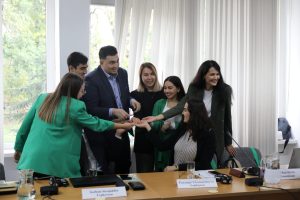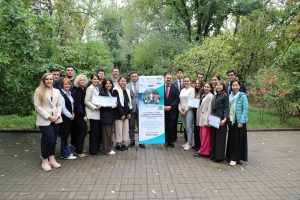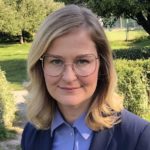PROJECT: WOMEN IN WATER MANAGEMENT IN CENTRAL ASIA AND AFGHANISTAN2023 Central Asia and Afghanistan Update
Leaders of Central Asia – engaging youth in national climate change priorities, regional cooperation and climate finance for sustainable development
Submitted by Tais Reznikova and CAREC Team
 The 13th Central Asia Leadership Program (CALP) held September 18-22, 2023 was a dynamic and interactive leadership program designed to empower young professionals in Central Asia to actively engage in addressing national climate change priorities, fostering regional collaboration, and exploring climate financing mechanisms for sustainable development. Through a combination of expert lectures, interactive sessions, case studies, and networking opportunities, participants developed leadership skills, enhanced their understanding of climate change challenges, and contributed to practical solutions for sustainable development in the region. The overarching goal of the 13th CALP was to provide opportunities for young professionals in the region to become influential leaders in the field of environmental sustainability. By equipping young professionals with the necessary knowledge, skills and networks, CALP aims to develop a new generation of people capable of addressing climate change, promoting sustainable development and building regional cooperation to build a sustainable and green future in Central Asia.
The 13th Central Asia Leadership Program (CALP) held September 18-22, 2023 was a dynamic and interactive leadership program designed to empower young professionals in Central Asia to actively engage in addressing national climate change priorities, fostering regional collaboration, and exploring climate financing mechanisms for sustainable development. Through a combination of expert lectures, interactive sessions, case studies, and networking opportunities, participants developed leadership skills, enhanced their understanding of climate change challenges, and contributed to practical solutions for sustainable development in the region. The overarching goal of the 13th CALP was to provide opportunities for young professionals in the region to become influential leaders in the field of environmental sustainability. By equipping young professionals with the necessary knowledge, skills and networks, CALP aims to develop a new generation of people capable of addressing climate change, promoting sustainable development and building regional cooperation to build a sustainable and green future in Central Asia.
The program’s first day served as the program’s ‘Water Day’, during which participants attended lectures by international experts in water diplomacy, gender equality, and sustainable development. During the first session, which focused on state management in the water sector, participants were introduced to the approaches of Integrated Water Resources Management (IWRM), progress in implementing IWRM practices in Central Asia, and discussed the main constraints to sustainable cooperation among regional countries in transboundary river basins.
Bo Libert, a Swiss Development Cooperation consultant, presented the Water Footprint Assessment methodology and its application results in Central Asia. This methodology allows the assessment of water usage efficiency at the basin, country, or regional level, which is crucial for sustainable water management. It also helps track how changes in agricultural crop production affect the economic value of water. In the second session on water diplomacy, Kerry Schneider, Senior Programme Manager, Stockholm International Water Institute (SIWI) and champion of the Women in Water Diplomacy Network, provided an overview of the theoretical aspects of hydro-diplomacy, emphasizing the importance of multi-vector diplomacy in expanding the diplomatic space for engaging stakeholders. Practical cases of successful transboundary water cooperation in the Tigris River basin by Burcu Çalli of the Water Institute (SUEN) of the Ministry of Agriculture and Forestry of Turkey, as well as in the Orange and Vaal rivers by Dr. Zodwa Dlamini, an independent consultant, member of the Women in Water Diplomacy Network Leadership Council and former member of the Water Commission of Lesotho, were presented.

One of the innovative tools introduced during the session was the Blue Peace Index by Mr. Matus Samel from Economist Impact. This index measures the extent to which countries and basins are prepared to manage shared water resources sustainably, equitably, and cooperatively. The index assessment was conducted for the Syr Darya and Amu Darya River basins, allowing for a comprehensive exploration of the driving forces and necessary conditions for sustainable cooperation in the use of shared water resources.
During the “Water and Gender” session, Dr. Saule Ospanova, Senior Environmental Adviser at the OSCE Vienna, outlined the OSCE’s activities to promote gender equality and expand opportunities for early-career women in the water sector in the region. She introduced the Network “Women in Water Management in Central Asia and Afghanistan,” which was established with the support of SIWI and CAREC in 2021. Dr. Ospanova highlighted several tools presented on the OSCE e-learning platform to enhance the potential of young water practitioners. As part of the efforts to digitize the water sector, the OSCE, in partnership with the International Union for Conservation of Nature (IUCN) and the Swiss Agency for Development and Cooperation (SDC), has developed innovative tools for data and information exchange to promote transboundary cooperation. This toolkit was presented by Diego Jara, from the Environmental Law Centre of IUCN. During his presentation, Mr. Jara emphasized the importance of data exchange regarding the availability and structure of water resources. Such data exchange enhances transparency and accountability in water resource management, thus strengthening trust and cooperation among riparian countries. Furthermore, a comprehensive understanding of the issues, priorities, and interests of countries in managing transboundary waters is crucial for developing effective management plans, programs, policies, laws, and agreements related to water. It is expected that this digitalization guide will assist countries in developing their own approaches to engage key stakeholders in hydrological and climate monitoring and assessment processes using innovative technologies. Shohida Tulieva, a gender expert in the Republic of Tajikistan, and member of the Women in Water Management of Central Asia and Afghanistan delivered a presentation on the existing mechanisms for promoting gender equality and youth involvement in water resource management in Tajikistan, particularly focusing on the Basin Women’s Forum experience.
Data and Information Exchange – and its role in facilitating transboundary water co-operation: OSCE’s session at the World Water Week
Submitted by OSCE Team
World Water Week is the leading conference on global water issues, with a tradition going back to 1991. Data and information exchange has gone through a revolutionary development since then. In this year’s edition, OSCE and the International Union for Conservation of Nature (IUCN), contributed with a session on “Facilitating Transboundary Water Co-operation through Data and Information Exchange” to World Water Week. The event gathered more than 50 participants from the water sector around the world – many of them young professionals – and was an occasion to discuss the importance of data and information exchange focusing on transboundary water management. A highlight of the event was the introduction of a “Data and Information Exchange Toolkit – Facilitating transboundary water management and governance through co-operation”, developed by OSCE in partnership with the IUCN Environmental Law Centre in Bonn. This toolkit is a result of the OSCE project “Water Diplomacy and Conflict Prevention” and facilitates the understanding of mechanisms relating to the exchange of data and information in transboundary waters.
One distinctive feature of the interactive panel was its emphasis on meaningful youth and women engagement. The event was indeed youth-driven, thanks to the participation of representatives from the Central Asia Youth for Water Network and the Women in Water Management Network in Central Asia and Afghanistan. Cholpon Aitakhunova (Kyrgyzstan), a member of the Women in Water Management Network in Central Asia and Afghanistan since 2021 highlighted that: “digital solutions and innovations are needed to ensure sustainable and cost-efficient water management that can tackle challenges such as climate change, pollution and water scarcity”.
The outcomes of the World Water Week session clearly underlined the significance of digitalization in water diplomacy processes. The active involvement of women and youth in the water sector demonstrates their potential as catalysts for positive change in the OSCE region and beyond. The session would not have been possible without the support of further partners: the Stockholm International Water Institute (SIWI), the Swiss Agency for Development and Cooperation (SDC), Geneva Water Hub and the Central Asia Youth for Water Network. More information and material on the OSCE work on water management can be accessed by visiting the following links:
- Office of the Co-ordinator of OSCE Economic and Environmental Activities (OCEEA) | OSCE
- Enhancing co-operation over sustainable transboundary water resources
- Project page of “Women, Water Management and Conflict Prevention – Phase III”
- OSCE manual Gender Mainstreaming in Water Governance in Central Asia | OSCE

